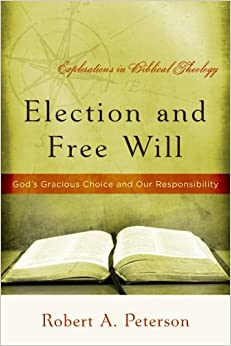A Brief Book Summary from Books At a Glance
By Benjamin J. Montoya
About the Author
Robert A. Peterson (MDiv, Biblical Theological Seminary; PhD, Drew University) was professor of systematic theology at Covenant Seminary for more than twenty-five years. He has served seven churches as an interim pastor and is the author of a number of books, including Hell on Trial, Adopted by God, and Election and Free Will.
Introduction
Election and free will are two very pervasive biblical doctrines, but they are also very divisive. How should we understand them and their relationship? Consider Peterson’s book to learn more!
Table of Contents
Chapter 1 Why a Book on Election and Free Will?
Chapter 2 Election and Free Will in Church History
Chapter 3 Election in the Old Testament
Chapter 4 Election in the Gospels and Acts
Chapter 5 Election in the General Epistles and Revelation
Chapter 6 Election in Paul’s Epistles, Part 1
Chapter 7 Election in Paul’s Epistles, Part 2
Chapter 8 Free Will
Chapter 9 The Bible’s Story of Election
Chapter 10 Objections to and Applications of Election
Summary
Chapter 1: Why a Book on Election and Free Will?
Why would anyone bother writing a book on election and free will, two highly debated topics? First, there remains a need for graciousness in the debate about election. There are two positions: Calvinism and Arminianism. Although these positions are clearly different on both of these topics, the rhetoric used in the debates from both sides has become problematic, such that one side can be just as ugly as the other. That is a huge problem given the prevalence of these doctrines in Scripture.
Second, despite the heated debates, there is a tremendous scriptural witness to election. God elected his people Israel, his Messiah, and the Church. Consider the references to the Church:
And if those days had not been cut short, no human being would be saved. But for the sake of the elect those days will be cut short (Matt. 24:22).
I am praying for them. I am not praying for the world but for those whom you have given me, for they are yours (John 17:9).
And when the Gentiles heard this, they began rejoicing and glorifying the word of the Lord, and as many as were appointed to eternal life believed (Acts 13:48).
For those whom he foreknew he also predestined to be conformed to the image of his Son, in order that he might be the firstborn among many brothers. And those whom he predestined he also called, and those whom he called he also justified, and those whom he justified he also glorified (Rom. 8:29–30).
This a doctrine to be studied and presented in an approach that seeks to do better than the previously mentioned ugliness.
Finally, there are many insecurities about the contemporary life to which these doctrines can speak. We live in a time when many people appear to live as islands to themselves, using technology as a means of entertainment as well as a means to avoid human interaction. This can be seen especially on eight-hour plane rides.
Chapter 2: Election and Free Will in Church History
To understand the doctrines of election and free will, one important starting point is to understand the development and explanation of these doctrines through the lens of Church History, or historical theology. This vantage point, so to speak, helps us see how others have understood the Bible’s teaching on these important topics.
There are four major periods covered in this book:
- The Ancient Period (AD 1–500)
- The Medieval Period (AD 500–1500)
- The Reformation Period (AD 1500–1700)
- The Modern Period (AD 1700–Present)
The remainder of this article is premium content. Become a member to continue reading.
Already have an account? Sign In
